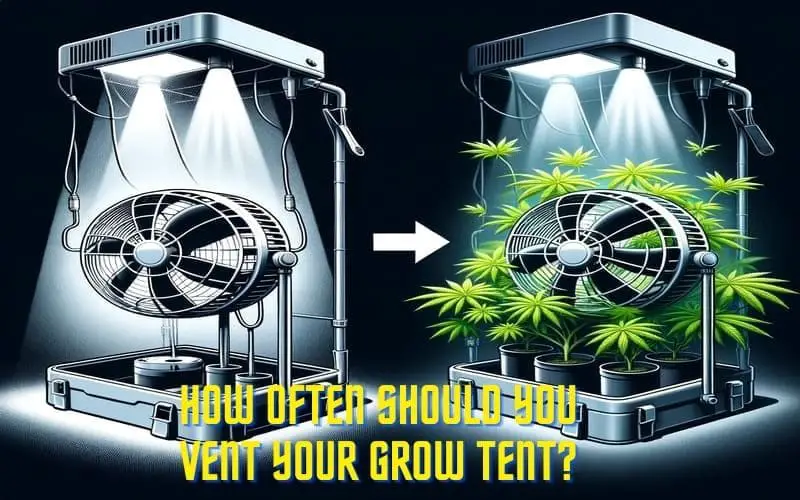How often should you vent your grow tent? Vital Information!

Introduction
Welcome to our comprehensive guide on ventilating your grow tent. If you’re a hydroponic enthusiast looking to maximize plant growth and create an ideal environment for your plants, proper ventilation plays a crucial role. In this article, we’ll explore the importance of ventilating your grow tent, the benefits it brings, and valuable tips to ensure you’re doing it right. Let’s dive in and uncover the secrets to optimizing your grow tent ventilation.
Answer to the Question
How often should you vent your grow tent? It’s a common question among hydroponic growers. The frequency of venting your grow tent depends on several factors, including the type of plants, environmental conditions, and the specific setup of your grow tent. Let’s delve into the details to find the optimal answer to this question.
Benefits of Ventilating Your Grow Tent
Ventilating your grow tent is a crucial aspect of maintaining an optimal environment for hydroponic cultivation. The benefits of proper ventilation extend beyond just managing temperature and humidity; they play a pivotal role in maximizing the health and productivity of your plants. Let’s delve deeper into the numerous advantages of ventilating your grow tent:
- Temperature Regulation: Proper ventilation helps to maintain an ideal temperature range, ensuring that your plants are not exposed to extreme heat or cold, which can impede their growth and development.
- Humidity Control:By regulating airflow and ventilation, you can effectively manage the humidity levels within the grow tent, preventing excessive moisture that can lead to mold and mildew formation.
- Air Quality Management: Ventilation promotes the circulation of fresh air, aiding in the removal of pollutants and stagnant air, thus enhancing the overall air quality within the grow tent.
- Pest and Disease Prevention: Proper ventilation discourages the proliferation of pests and diseases by creating an environment that is less conducive to their growth and survival, safeguarding the health of your plants.
- Promotion of Healthy Airflow: Well-ventilated grow tents facilitate a consistent and healthy airflow, ensuring that carbon dioxide is efficiently distributed among the plants during the photosynthesis process.
- Enhanced Efficiency of Grow Tent Components: Optimal ventilation optimizes the performance of other essential grow tent components, such as lighting, CO2 supplementation, and air circulation systems, resulting in improved overall efficiency.
Factors to Consider When Venting Your Grow Tent
Proper ventilation is essential for the success of your indoor gardening endeavors. When it comes to venting your grow tent, there are several critical factors that require thoughtful consideration to ensure that your plants thrive in the optimal environment. Let’s delve into the key factors to consider:
- Plant Type: Different plants have varying ventilation needs. Understanding the specific requirements of your plant type is crucial for providing the appropriate ventilation.
- Grow Tent Size: The size of your grow tent directly impacts the effectiveness of ventilation. Larger tents require powerful ventilation systems to maintain proper air circulation.
- Environmental Conditions: Factors such as temperature, humidity, and CO2 levels play a significant role in the ventilation requirements. Maintaining an ideal environment is vital for healthy plant growth.
- Ventilation System: Selecting the right ventilation system is crucial. Whether it’s exhaust fans, carbon filters, or air circulation fans, choosing the appropriate system is key to successful ventilation.
- Placement of Vents: Strategically positioning intake and exhaust vents is vital for efficient air exchange. Proper placement prevents stagnant air and ensures uniform distribution of fresh air.
- Air Circulation: Utilizing fans to promote air circulation is essential. Proper airflow helps maintain consistent temperature and humidity levels, contributing to the overall health of your plants.
Understanding and carefully considering these factors is pivotal in achieving an optimal indoor growing environment. By addressing these considerations, you can make well-informed decisions to ensure that your grow tent ventilation meets the unique needs of your plants and supports their optimal growth.
Tips for Properly Ventilating Your Grow Tent
Proper ventilation is crucial for the health and success of your plants in a grow tent. Here are some valuable tips to ensure that your grow tent is properly ventilated:
- Use the Right Exhaust Fan: The exhaust fan is a key component of the ventilation system. Choose an exhaust fan that is appropriate for the size of your grow tent. Consider the airflow capacity and noise level when selecting the fan.
- Install Carbon Filters: Carbon filters are essential for removing odors and purifying the air inside the grow tent. Make sure to install high-quality carbon filters to maintain a clean and odor-free environment.
- Position Intake and Exhaust Ports: Proper placement of intake and exhaust ports is vital for effective air circulation. Position intake ports near the plants to supply fresh air, and locate exhaust ports at the top of the tent to expel hot, stale air.
- Monitor Temperature and Humidity: Use a hygrometer and thermometer to monitor the temperature and humidity levels inside the grow tent. Adjust the ventilation system as needed to maintain optimal growing conditions.
- Consider Lightproof Ducting: Lightproof ducting prevents light leaks and maintains a controlled environment inside the grow tent. Invest in high-quality, lightproof ducting to ensure that your plants receive the appropriate amount of light during their growth.
Conclusion
In conclusion, the question of how often to vent your grow tent has a simple answer: as often as necessary. Proper ventilation is crucial for the health and growth of your plants, and neglecting it can lead to a host of issues. By following the tips and considerations outlined in this article, you can ensure that your grow tent is properly ventilated and your plants are thriving.
Ventilating your grow tent not only benefits your plants, but it also benefits you as a grower. Adequate ventilation helps to regulate temperature, humidity, and air circulation, creating an optimal environment for your plants to grow. It also helps to prevent the buildup of harmful gases and mold, which can be detrimental to both your plants and your health.
So, don’t overlook the importance of proper ventilation in your grow tent. Take the time to assess your setup, consider the factors involved, and implement the necessary measures to ensure your plants have the best chance of success. With the right ventilation, you can maximize your plant growth and achieve a bountiful harvest.
